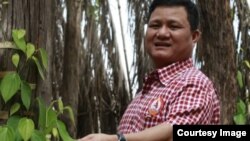Cambodia’s government appears to have begun taking action to tackle illegal logging, but much of the movement on the issue remains “only on paper,” a campaigner from a leading environmental crime and corruption watchdog said.
It’s now well over a year since the U.K.-based group Global Witness issued its revealing report “The Cost of Luxury.” The report detailed the lucrative trade in luxury-grade timber and singled out well-known tycoon Try Pheap as the head of a criminal network relying on official collusion to cut and remove wood illegally from Cambodia’s dwindling forests for sale overseas.
Speaking to VOA Khmer from London, Global Witness senior land campaigner Josie Cohen said that although officials publicly rejected the findings, the government appeared to react to the publication of the report in February 2015.
“Soon after [the report was published], a parliamentary committee was formed in Cambodia to look into the allegations around the illegal logging, and considered the evidence in the report,” she said.
Little has been heard from the committee, but a number of developments early this year gave campaigners some hope, Cohen said. Prime Minister Hun Sen has made several proclamations about illegal logging, and created a “task force” to identify those economic land concessions that are being used merely as cover for logging.
“But at the moment, that protection is only on paper, and we’re seeing in Cambodia the way protected areas such as Virak Chey have completely disappeared,” Cohen said, referring to the national park in Ratanakkiri province.
Try Pheap, meanwhile, has claimed the report’s allegations are false, insisting that timber smugglers were using his name without permission. “But that [allegation] was the result of a one-year investigation, and we know that [the denial] is not true,” she said.
The government has reduced the maximum term of economic land concessions from 99 to 50 years, but the expert on land rights said this does little to prevent abuses.
“It’s a move in the right direction, but there is absolutely nothing to stop the government in 50 years to extend those licenses,” said Cohen. “And, also, it’s very hard to say because the government does not release any information on economic land concessions.”
As of late 2013, an estimated 73 percent of Cambodia’s arable land (about 2.6 million hectares) had been leased to various private companies in the form of economic land concessions, according to the local rights group Adhoc. The government claims these concessions, handed to companies for a nominal cost, are beneficial to the country as they create jobs and drive agricultural exports. But a growing body of evidence shows that the policy has pushed many people in rural areas deeper into poverty.
“There is a lot of human rights impact on top of the livelihood impact,” Cohen said. “It’s also affecting cultural identity, particular for indigenous communities.”
“The government needs to end the persecution of the environmental defenders,” added Cohen. “The government also needs to work very closely with local communities.”




